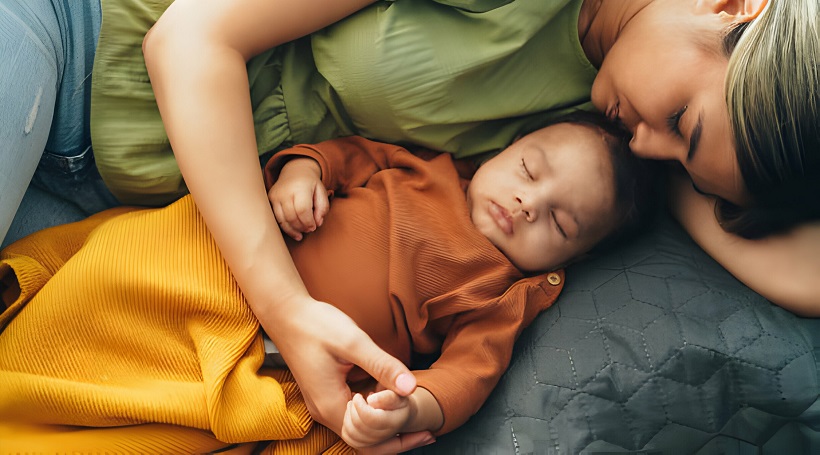Last Updated on January 1, 2025
Babies typically start sleeping from 7pm to 7am around 6 to 9 months. This milestone depends on their development, feeding patterns, and ability to self-soothe.
Baby’s sleep patterns can feel like decoding a complex puzzle. One of the most common questions new parents have is: When will my baby sleep from 7pm to 7am? The answer to this is both hopeful and complex, as it involves numerous factors including developmental stages, sleep training methods, and individual differences among babies. Let’s dive into the intricacies of baby sleep schedules, offering insights and strategies to help your baby (and you) get a good night’s sleep.

Baby Sleep Patterns
Newborns have very different sleep needs and patterns compared to older babies. Initially, babies sleep up to 16-17 hours a day, spread out over short periods due to the need for frequent feeding. This is because their tiny stomachs can’t hold much milk, making them wake up often to eat, day and night.
As babies grow, their sleep patterns start to change. By the age of 3-4 months, many babies begin to develop a more predictable pattern of sleep, including longer stretches at night. However, it’s important to note that “sleeping through the night” at this stage might mean sleep stretches of 5-6 hours.
Read More – How To Put A Baby To Sleep In 40 Seconds?
The Golden Milestone: 7pm to 7am
For most parents, the ultimate sleep goal is having their baby sleep from 7pm to 7am. This 12-hour night sleep is a milestone that babies can achieve, typically around the age of 6 months to a year. This is because, by this age, most babies have developed the ability to sleep longer stretches and may no longer need night feedings. However, this can vary widely from baby to baby.
Factors Influencing Nighttime Sleep
Several factors influence when a baby can start sleeping through the night, including:
- Developmental Milestones: Babies who are working on developmental milestones, such as crawling or teething, may have disrupted sleep patterns.
- Feeding: The introduction of solid foods around 6 months can also impact sleep, as it may help babies feel fuller longer.
- Sleep Environment: A quiet, dark, and comfortable sleeping environment can promote longer sleep stretches.
- Routine: Establishing a consistent bedtime routine can signal to your baby that it’s time to wind down for the night.
Read More – Halle Bailey Pregnant? Pregnancy Rumors and the Truth
Strategies for Encouraging Longer Sleep Stretches
- Establish a Bedtime Routine: A predictable sequence of events leading up to bedtime can help cue your baby that it’s time to sleep. This might include a bath, reading a book, and cuddling.
- Create a Conducive Sleep Environment: Make sure your baby’s sleep environment is dark, quiet, and at a comfortable temperature. Consider using white noise to drown out household noise.
- Encourage Daytime Naps: Adequate daytime sleep is essential for nighttime sleep. Overly tired babies may have difficulty settling down at night.
- Practice Safe Sleep Habits: Always place your baby on their back to sleep, and keep the crib free of toys, pillows, and blankets to reduce the risk of SIDS.
- Consider Gentle Sleep Training: Methods such as fading or pick-up-put-down can be effective for encouraging babies to self-soothe and fall asleep on their own.
- Patience and Flexibility: Remember, every baby is different, and achieving the 7pm to 7am sleep milestone can take time. Be patient and flexible in finding what works best for your baby.
Common Challenges
Despite your best efforts, there may be nights when your baby struggles to sleep well. Common challenges include illness, teething, and sleep regressions. During these times, it’s important to offer comfort and stick as closely as possible to your established routines while being adaptable.

Read More – Is Gwen Stefani Pregnant? An Examination of the Rumors
FAQs
When Do Babies Sleep 7pm to 7am?
Babies typically start sleeping from 7pm to 7am around 6 to 9 months. This milestone depends on their development, feeding patterns, and ability to self-soothe. Establishing a consistent bedtime routine and a conducive sleep environment can help encourage longer stretches of sleep.
When should I put my baby down at 7pm?
Putting your baby down at 7pm can start as early as a few months old, especially if they show signs of sleep readiness in the evening. A consistent early bedtime helps regulate their sleep patterns and ensures they get the necessary amount of sleep.
How do I get my baby to sleep until 7am?
To encourage your baby to sleep until 7am, establish a consistent nighttime routine, ensure they have a comfortable sleep environment, and address any nighttime feedings appropriately. Gradually extending night sleep and ensuring they’re not overtired by bedtime are key strategies.
What age do babies go to bed at 7?
Babies can start going to bed at 7pm as early as 2-3 months of age. However, the exact timing can vary based on the baby’s individual sleep needs and patterns. Consistency and a calm bedtime routine are crucial for success.
How can I get my baby to sleep 7 to 7?
Getting your baby to sleep from 7pm to 7am involves creating a soothing bedtime routine, ensuring they’re comfortable and secure, and possibly implementing gentle sleep training techniques. Patience and consistency are essential, as babies adjust to this schedule at their own pace.
Conclusion
The journey to having your baby sleep from 7pm to 7am is unique for every family. While some babies may naturally start sleeping longer stretches early on, others may need a bit more assistance. By understanding the factors that influence sleep, establishing healthy sleep habits, and using gentle strategies to encourage longer stretches of sleep, you can gradually work towards achieving this sleep milestone. Remember, the process can require patience and flexibility, but with time and effort, you and your baby can enjoy the benefits of a good night’s sleep.

